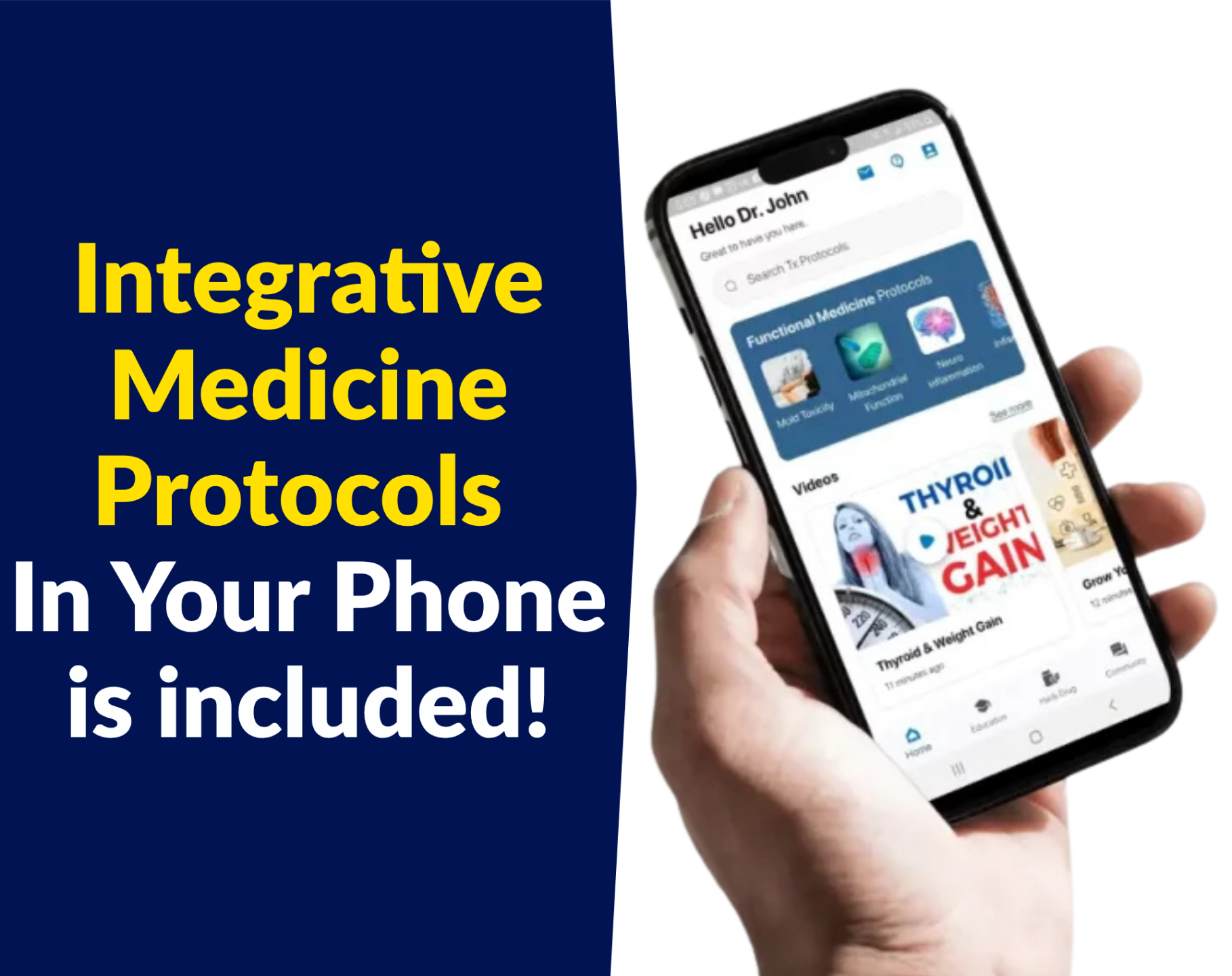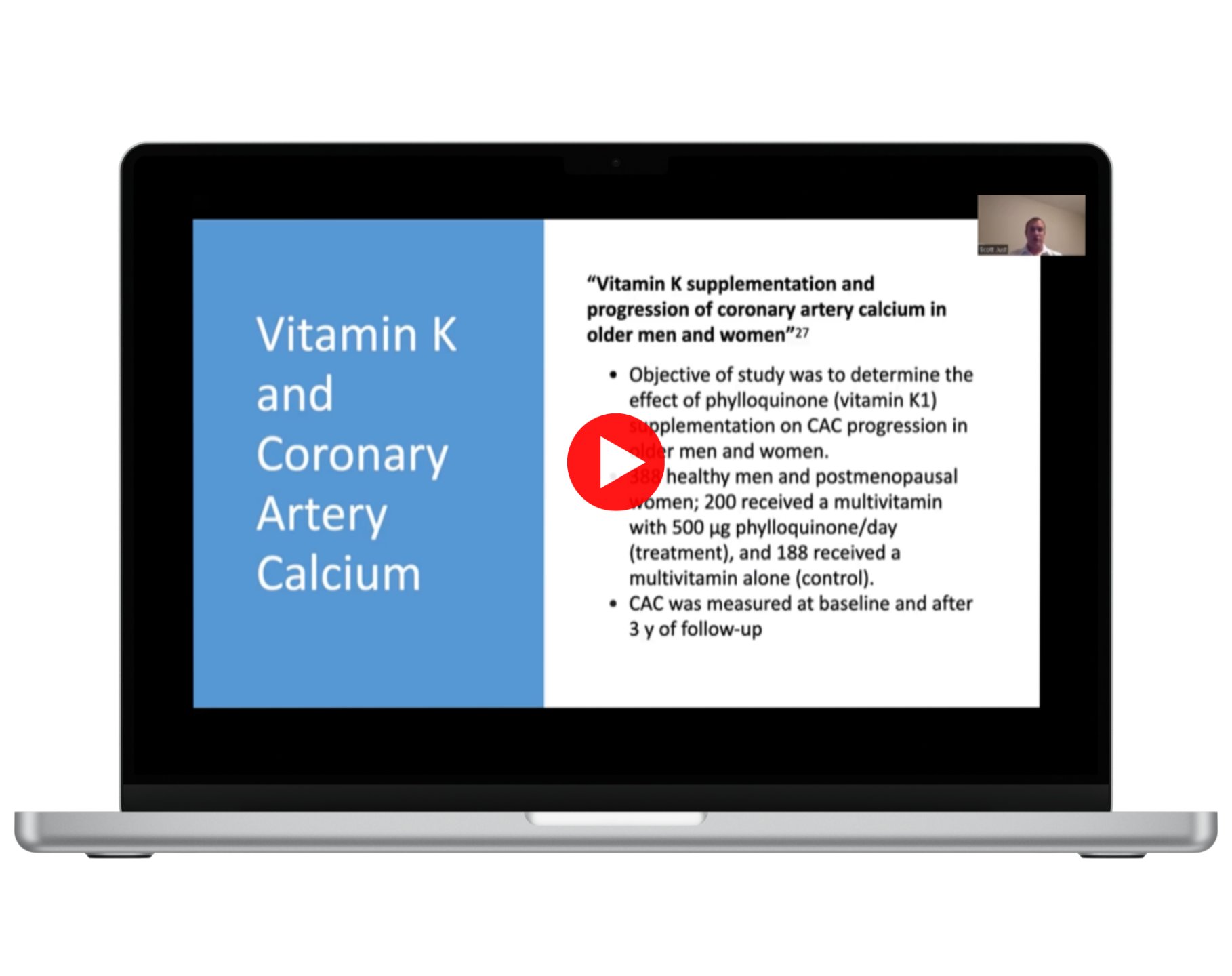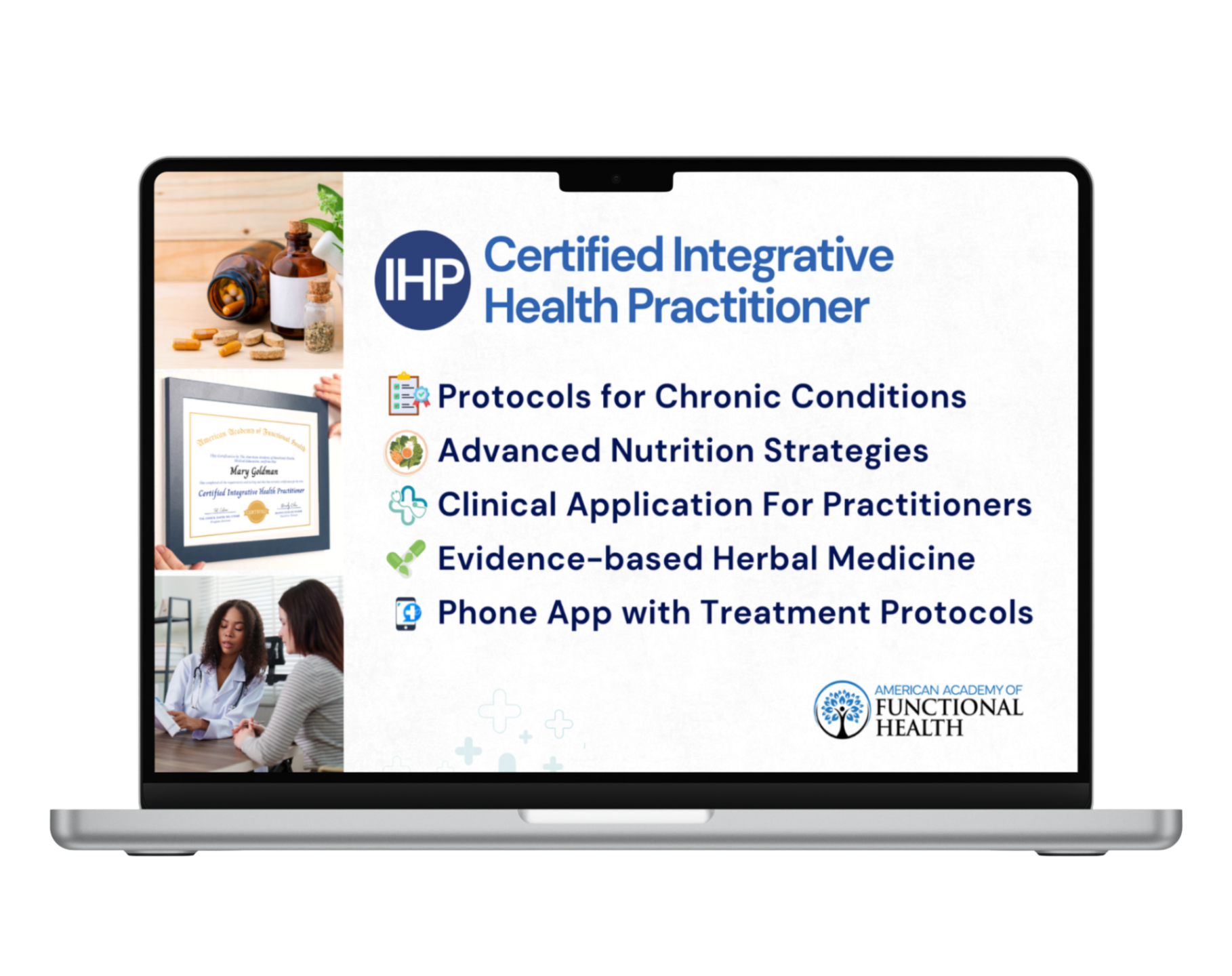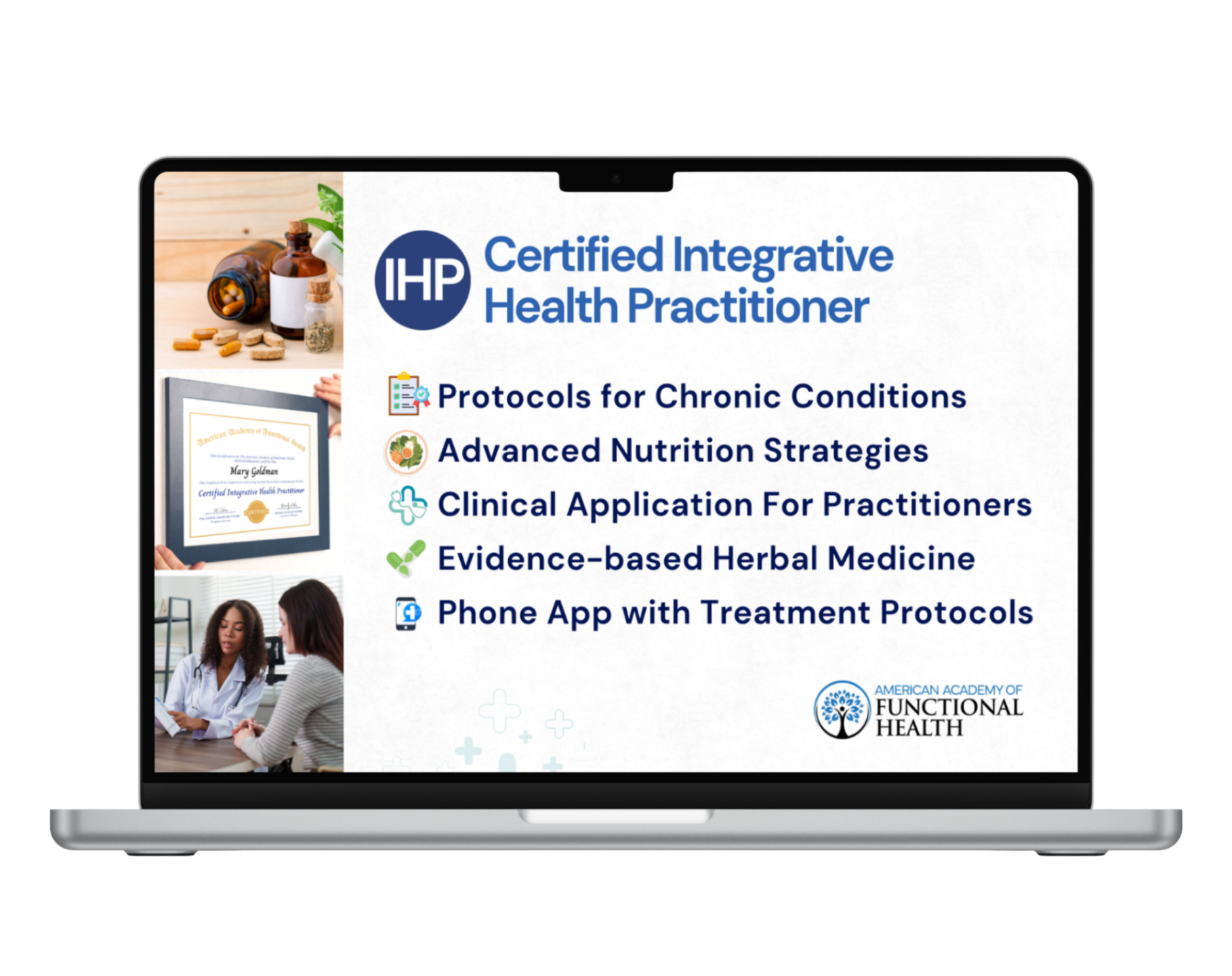Integrative Health Practitioner (IHP)
Certification
(100% Online, 10 Weeks, Live & On-demand Clinical Training)
Is Gluten Bad for Autoimmune Thyroid Conditions?
As gluten-free diets continue to grow in popularity, many patients with autoimmune thyroid disorders—especially Hashimoto’s thyroiditis—are left wondering: Is gluten harmful for thyroid health? While there’s no one-size-fits-all answer, integrative medicine offers valuable insights into how gluten may affect people with autoimmune thyroid conditions.
What Is Gluten and Why Does It Matter?
Gluten is a group of proteins found in wheat, barley, and rye. It gives bread its structure and elasticity, but in some people, gluten can trigger immune reactions that cause a wide range of symptoms—from bloating and fatigue to joint pain and brain fog (Biesiekierski, 2017).
While gluten sensitivity is commonly linked to digestive issues, its role in autoimmune disease is becoming more well-recognized, especially in thyroid conditions like Hashimoto’s thyroiditis (Lionetti et al., 2015).
The Link Between Gluten and Autoimmune Thyroid Disease
A small study involving 34 women with autoimmune thyroiditis showed that a gluten-free diet over six months significantly reduced thyroid antibodies, suggesting that avoiding gluten may help lower inflammation and autoimmunity (Krysiak, Szkrobka, & Okopień, 2019). However, larger studies have shown mixed results, and more research is needed to confirm these findings.
Gluten Sensitivities: It’s Not Just Celiac Disease
There are three primary ways people can react to gluten:
- Celiac Disease: A serious autoimmune condition where even trace amounts of gluten damage the gut lining. This condition is strongly linked with increased intestinal permeability (Fasano, 2012).
- Wheat Allergy: A classic IgE-mediated food allergy, resulting in hives, anaphylaxis, or gastrointestinal symptoms.
- Non-Celiac Gluten Sensitivity (NCGS): A condition where gluten causes symptoms despite the absence of celiac disease or wheat allergy. Individuals with NCGS often report symptoms like fatigue, brain fog, or joint pain (Volta et al., 2014).
Gluten, Leaky Gut, and Autoimmunity
Emerging research indicates that gluten can stimulate the release of zonulin, a protein that increases intestinal permeability. This "leaky gut" phenomenon is believed to be a key mechanism in the development of autoimmune diseases, including Hashimoto’s (Fasano, 2012).
When the intestinal barrier is compromised, antigens and toxins may enter the bloodstream, provoking an immune response and contributing to systemic inflammation.
It’s Not Just Gluten—Other Compounds in Wheat Matter Too
Modern wheat contains additional inflammatory compounds, such as:
- FODMAPs, which may exacerbate bloating and discomfort in sensitive individuals (Staudacher et al., 2012).
- Alpha-amylase trypsin inhibitors (ATIs), shown to activate innate immune responses (Junker et al., 2012).
- Wheat germ agglutinin (WGA), a lectin that may impair intestinal integrity and contribute to inflammation (Shanahan, 2013).
These factors suggest that some individuals may react poorly to wheat, even beyond gluten alone.
Testing for Gluten Sensitivity: Is It Worth It?
Integrative medicine practitioners sometimes use advanced food sensitivity tests like the ALCAT or MRT to identify non-IgE-mediated immune reactions. However, the gold standard remains an elimination diet, which involves removing gluten for several weeks and reintroducing it while monitoring symptoms (Catassi et al., 2015).
Going Gluten-Free: What to Watch Out For
Gluten is found in many processed and hidden sources, including:
- Soy sauces, marinades
- Salad dressings
- Meat substitutes
- Cereals and snack foods
- Nutritional supplements, medications, and even personal care products
Careful label reading and certified gluten-free products are key during elimination phases.
Whole Grains and Thyroid Health: Is All Wheat Bad?
Ancient grains like einkorn or spelt may be better tolerated and offer fiber, vitamins, and minerals. However, modern wheat—often hybridized and processed—may carry higher risks of immunogenicity (Shewry & Hey, 2016).
Should You Eliminate Gluten for Hashimoto’s?
You may benefit from a gluten-free diet if:
- You have Hashimoto’s with persistent symptoms
- You have celiac disease or positive gluten sensitivity tests
- You experience fatigue, brain fog, or digestive issues after gluten exposure
You may not need to go gluten-free if:
- You have no symptoms and no sensitivity
- Your thyroid markers are well-controlled
Final Thoughts: Personalizing the Approach
Gluten is not universally harmful, but for some individuals—particularly those with autoimmune thyroid disease—it may contribute to chronic inflammation and symptom burden. Integrative medicine emphasizes a personalized approach to identify hidden dietary triggers and optimize thyroid health.
References
Biesiekierski, J. R. (2017). What is gluten? Journal of Gastroenterology and Hepatology, 32(Suppl 1), 78–81. https://doi.org/10.1111/jgh.13703
Catassi, C., Elli, L., Bonaz, B., Bouma, G., Carroccio, A., Castillejo, G., ... & Zevallos, V. (2015). Diagnosis of non-celiac gluten sensitivity (NCGS): The Salerno Experts’ Criteria. Nutrients, 7(6), 4966–4977. https://doi.org/10.3390/nu7064966
Fasano, A. (2012). Zonulin and its regulation of intestinal barrier function: The biological door to inflammation, autoimmunity, and cancer. Physiological Reviews, 91(1), 151–175. https://doi.org/10.1152/physrev.00003.2008
Junker, Y., Zeissig, S., Kim, S. J., Barisani, D., Wieser, H., Leffler, D. A., ... & Schuppan, D. (2012). Wheat amylase trypsin inhibitors drive intestinal inflammation via activation of toll-like receptor 4. The Journal of Experimental Medicine, 209(13), 2395–2408. https://doi.org/10.1084/jem.20102660
Krysiak, R., Szkrobka, W., & Okopień, B. (2019). The effect of gluten-free diet on thyroid autoimmunity in drug-naïve women with Hashimoto’s thyroiditis: A pilot study. Experimental and Clinical Endocrinology & Diabetes, 127(07), 417–422. https://doi.org/10.1055/a-0824-9155
Lionetti, E., Leonardi, S., Franzonello, C., Mancardi, M., Ruggieri, M., Catassi, C., & La Rosa, M. (2015). Gluten psychosis: Confirmed case of non-celiac gluten sensitivity with psychiatric manifestations. Gastroenterology, 148(5), S-451. https://doi.org/10.1016/S0016-5085(15)32499-3
Shanahan, F. (2013). The host–microbe interface within the gut. Best Practice & Research Clinical Gastroenterology, 27(5), 741–749. https://doi.org/10.1016/j.bpg.2013.09.006
Shewry, P. R., & Hey, S. J. (2016). The contribution of wheat to human diet and health. Food and Energy Security, 4(3), 178–202. https://doi.org/10.1002/fes3.64
Staudacher, H. M., Whelan, K., Irving, P. M., & Lomer, M. C. E. (2012). Comparison of symptom response following advice for a diet low in fermentable carbohydrates (FODMAPs) versus standard dietary advice in patients with irritable bowel syndrome. Journal of Human Nutrition and Dietetics, 24(5), 487–495. https://doi.org/10.1111/j.1365-277X.2011.01162.x
Volta, U., Bardella, M. T., Calabrò, A., Troncone, R., & Corazza, G. R. (2014). An Italian prospective multicenter survey on patients suspected of having non-celiac gluten sensitivity. BMC Medicine, 12(85). https://doi.org/10.1186/1741-7015-12-85

What healthcare practitioners are saying about our classes:
A 10-Week Certification Program That Includes...

PROTOCOLS FOR CHRONIC DISEASES & SYMPTOMS
Evidence-Based Nutritional and Herbal Compounds that are simple and affordable and can support relief from chronic conditions and symptoms.

FOOD AS MEDICINE
How to Use Dietary and Lifestyle Medicine as Clinical Interventions to help your patients improve their health and function using dietary patterns, physical activity, sleep optimization, and stress resilience techniques.

MASTER PRECISION MEDICINE
Creating a Personalized Treatment Plan For Patients with Cardiovascular, Gastrointestinal, Musculoskeletal, and Autoimmune Conditions

DON'T FORGET HEALTH OPTIMIZATION
Special Training on Healthy Metabolism, Body Weight, and Women's Health at Different Stages of Life with Integrative Medicine

INTEGRATIVE MEDICINE FOR YOUNG PATIENTS
Learn Integrative (drug-free) Treatment Protocols for Common Pediatric Conditions (including flu, ear infections, Sore throat, UTI, Hand, foot & Mouth, Pink eye, and supporting healthy immune function)

✔ Get 24/7 Access to All Classes
✔ Weekly Live Class to Advance Your Skills
✔ Get Certified in 10 Weeks
✔ Bonus Package Included (see below)

BONUS #1 EASY & FAST ACCESS TO ALL YOUR PROTOCOLS
Access to a Unique Phone App with Treatment Protocols for Hundreds of Chronic Adult & Pediatric Conditions
(3-Year Access Included as a gift)

BONUS #2 INTEGRATIVE MEDICINE CLINICAL GUIDE
A Clinician's Guide To Applying Clinical Nutrition & Herbal Medicine.

BONUS #3 WATCH & REVIEW AGAIN ANYTIME
Access to all the recorded classes and case studies for 12 months

Clinical Tools, Treatment Frameworks, and Real-world Strategies
10-Week Curriculum Overview
Week 1: Clinical Foundation & Food As Medicine
- Explore in depth the foundations of health, wellness, and restoration of function through an integrative framework that combines clinical nutrition, botanical medicine, lifestyle strategies, and mind-body approaches.
- Learn how these modalities work together to prevent and address chronic disease while supporting resilience and vitality.
Week 2: Cardiovascular Health
- Gain practical tools for the prevention and integrative management of hypertension, dyslipidemia, coronary artery disease, and heart failure.
- Review evidence-based nutrition, botanicals, and lifestyle interventions that promote vascular health and post-stroke recovery.
Week 3: Metabolic Health, Diabetes & Kidney Function
- Learn specific protocols for patients with insulin resistance, diabetes, obesity, and chronic kidney disease.
- A special class on Functional Blood Chemistry shows how to apply targeted nutritional and botanical strategies to restore abnormal cardiometabolic, kidney, and lipid biomarkers.
Week 4: Gastrointestinal Disorders
- Learn specific protocols for patients with GERD, IBS, constipation, diarrhea, ulcers, and fatty liver disease.
- Discuss key concepts in malabsorption and digestive dysfunction, including low stomach acid, pancreatic and bile insufficiency, and explore therapeutic strategies to support digestion, nutrient absorption, and microbiome balance.
Week 5: Thyroid & Women’s Hormonal Health
- Explore integrative approaches to hypothyroidism, PMS, PCOS, perimenopause, and menopause.
- Understand how nutrition, stress, circadian rhythm, and endocrine-disrupting exposures influence hormonal balance—and how to restore it using adaptogenic herbs and lifestyle medicine.
Week 6: Chronic Pain & Musculoskeletal Health
- Gain practical tools to address chronic joint pain, osteoarthritis, fibromyalgia, muscle pain, and neuropathy through a whole-person, integrative approach.
- Learn nutritional and botanical therapies for inflammation modulation, mitochondrial support, and joint restoration.
Week 7: Immune Balance & Autoimmune Conditions
- Learn strategies for supporting healthy immune function and understanding the impact of diet and lifestyle on immune dysregulation (e.g., IL-6 vs. IL-10).
- Explore approaches for restoring immune balance in post-COVID patients and review treatment protocols for autoimmune conditions, including rheumatoid arthritis, psoriasis / psoriatic arthritis, lupus, and multiple sclerosis (MS).
Week 8: Mental Health & Mood Disorders
- Take an integrative approach to depression, anxiety, PTSD, and postpartum mood disorders.
- Discover nutritional psychiatry, botanicals for mood and sleep, and lifestyle strategies that promote neurotransmitter balance and emotional resilience.
Week 9: Healthy Aging & Geriatric Health
- Explore the physiology of aging and evidence-based approaches to preserve vitality.
- Learn practical interventions for cognitive decline, dementia, osteoporosis, and sarcopenia, focusing on nutrition, movement, and hormonal support for longevity and quality of life.
Week 10: Food as Medicine & Integrative Management Strategies
- Apply everything you’ve learned through real-world case studies and clinical frameworks.
- Explore natural solutions for hormonal imbalances, the use of peptide therapy, and practical steps for growing a successful Integrative Medicine practice.
- Review an Integrative Medicine flow model—from dietary and lifestyle assessment to social support and readiness for change—using a simple structure of one dietary, one lifestyle, and three supplement recommendations, followed by a strategic follow-up plan.
- Cover the clinical application, pros, and cons of the most common diets, including when each approach may be indicated or contraindicated based on patient presentation and physiology.
Program Cost: $4,500
Healthcare provider scholarship includes a discount of $2,100!
Bringing the price to just $2,400
Apply For Program + Scholarship
-
You want multiple treatment options—like herbal and nutritional supplements— to support patients with chronic pain, cardiometabolic, autoimmune, women's health, geriatric, and mood disorders.
-
You want evidence-based dietary and lifestyle recommendations that complement medications and create real results—without guesswork or endless theory.
-
You want to become the go-to practitioner in your community who attracts committed patients and builds a thriving practice while learning at your own pace.
Presenters with Years of Clinical Experience

Dr. Asia Muhammad, ND
Dr. Asia Muhammad, ND, is a board-certified Naturopathic Doctor dedicated to bridging science and natural medicine. She earned her Bachelor’s degree in Chemistry and Biology from Middle Tennessee State University and her Doctorate of Naturopathic Medicine from Southwest College of Naturopathic Medicine and Health Sciences (SCNM) in Tempe, Arizona—an accredited medical institution that integrates both naturopathic and conventional medical approaches to healing.
After graduating in 2014, Dr. Asia completed a two-year residency in Integrative Medicine in Arizona, where she gained extensive experience in the evaluation and treatment of chronic diseases. Since then, she has continued her work in private practice, providing personalized, evidence-based care to support long-term wellness.
Her work has been published in leading journals, including Integrative Medicine: A Clinician’s Journal and the Journal of Natural Medicine. She also co-hosted the Amazon Prime award-winning docuseries The Art of Natural Healing, highlighting the power of evidence-based natural therapies.
Dr. Asia integrates clinical nutrition, botanical medicine, and lifestyle interventions to create individualized treatment plans tailored to each patient’s unique needs. A passionate advocate for Integrative Health, she empowers her patients to take an active role in prevention, healing, and sustainable self-care.

Dr. Matthew Cavaiola, ND, MS
Dr. Matthew Cavaiola is a naturopathic physician with 17 years of clinical experience in Functional, nutritional, and herbal medicine. He specializes in cardiometabolic conditions, detoxification, and men’s health.
He received a Bachelor’s Degree in Biology and a Master’s Degree in Human Nutrition from the University of Delaware, a Master's Degree in Acupuncture, and a Doctorate Degree in Naturopathic Medicine. He has been practicing as a Functional and integrative medicine physician for 17 years and was also an adjunct professor at the Sonoran University of Health Sciences and Bastyr University.

Tal Cohen, DAOM, MS
Tal Cohen, DAOM, MS-HNFM is an author and presenter with over 16 years of clinical experience with integrative, nutritional, and Eastern and Western herbal medicine.
He developed multiple Functional and Nutritional medicine programs, lectured nationwide, and is the author of several books and patient guides, including “Treating Pain and Inflammation with Functional Medicine: The Complete Clinical Guide” and “The Complete Guide to Removing Toxins & Improving Your Health.”
Tal completed a Master of Science in Human Nutrition and Functional Medicine and a Doctorate in Acupuncture and Oriental Medicine.

Dr. Chil Khakham, ND, MBA
Dr. Chil is a naturopathic physician with additional training in Functional Medicine, functional endocrinology, and functional blood chemistry.
His education includes a Bachelor of Science, a Master of Business Administration, and a Doctorate in Naturopathic Medicine.
Dr. Chil developed several Functional medicine programs and established and developed several successful brick-and-mortar and virtual practices.

Jessica Knese, MS, CNS
Jess graduated from the University of Colorado with a dual bachelor's degree in Integrative Physiology and Psychology and a Master's of Science in Clinical Nutrition and Integrative Health from Maryland University of Integrative Health. Jess is also a Certified Nutrition Specialist and has been working in several Functional and integrative medicine clinics with primary care providers who implement nutrition into their practice.
The Integrative Health Practitioner Certification Program
December 1st 2025

00
DAYS
00
HOURS
00
MINS
00
SECS
A COMPREHENSIVE PACKAGE
What's Included in the Program...
Register now and receive our comprehensive package and bonuses:
✅ Live Weekly Classes + Recordings — Engage in live training sessions and access all recordings anytime.
✅ Treatment Protocols for Common Conditions — Covering cardiovascular, metabolic, gastrointestinal, endocrine, musculoskeletal, immune, mental health, women's, and geriatric conditions, using evidence-based nutritional, botanical, and lifestyle medicine.
✅ Downloadable PDF Handouts for every class.
✅ Clinical Guides & Patient Resources to apply what you learn in practice.
✅ Private Member Portal with one-year access to all course materials and recordings.
✅ Printable Grocery Lists aligned with recommended nutritional protocols.
✅ Healthy Cooking eBook (Branded for Your Clinic) featuring simple, evidence-based recipes for patient support.
✅ Functional Medicine Phone App (1-Year PRO Access) — Instant access to protocols for hundreds of chronic conditions.
✅ Nursing Continuing Education (20 CEs) — Accepted in 46 out of 50 U.S. states.
✅ Printed Certification of Completion to showcase your new credentials.
✅ Lifetime Listing in Our Providers’ Directory to enhance your professional visibility.
✅Dedicated Phone app with treatment protocols for hundreds of adult and pediatric conditions
Program Cost: $4,500
Healthcare provider scholarship includes a discount of $2,100!
Bringing the price to just $2,400
Apply For Program + ScholarshipFrequently Asked Questions
Who can register to this program?
How long does it takes to get certified?
Why should I register for this program?
What if I cannot attend the 1hr live class every week?
Will I learn about the treatment protocols?
Who is the creator of the Integrative Health Practitioner Program?
I have additional questions. Who can I contact?
Apply For Program + Medical Scholarship
Schedule a short call with an academic advisor
The Integrative Health Practitioner
Certification Program
Starting December 1st 2025

00
DAYS
00
HOURS
00
MINS
00
SECS
